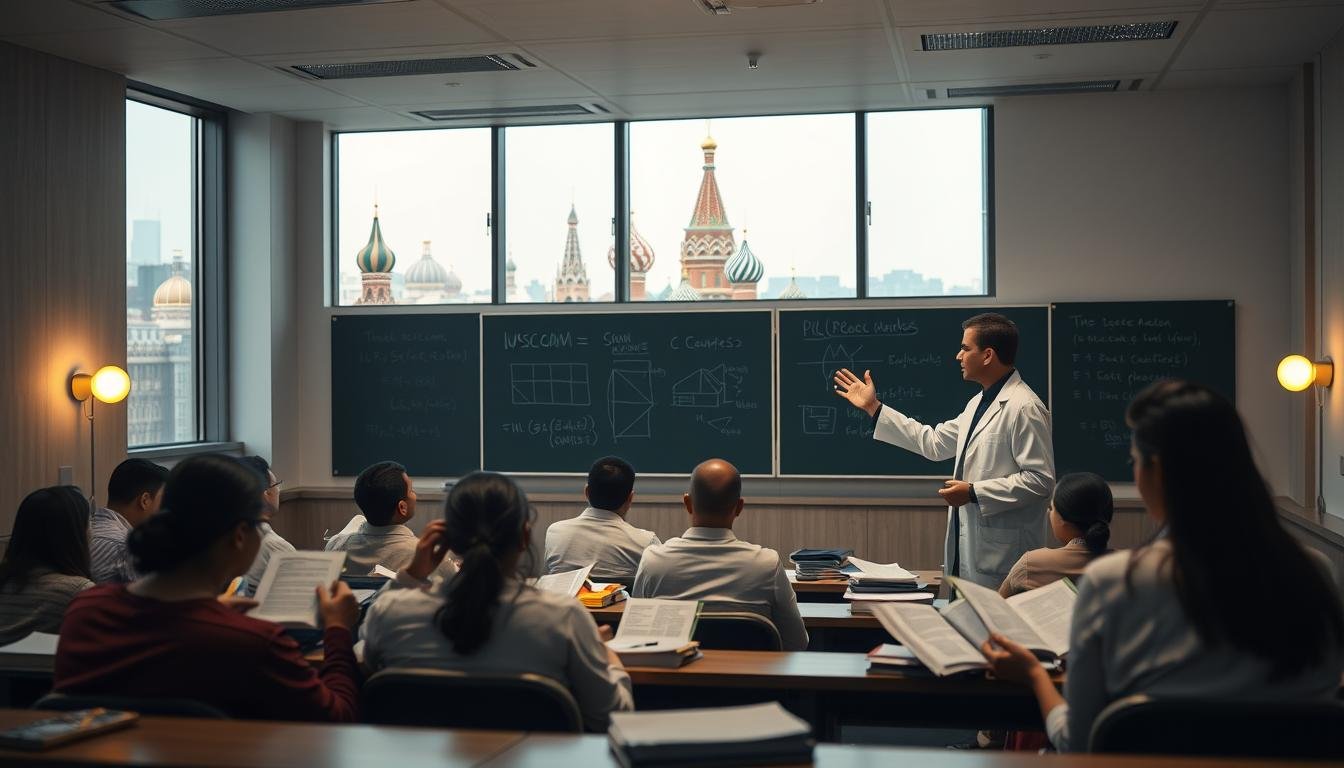Studying MBBS in Russia offers Indian students a unique opportunity to gain a globally recognized degree at an affordable cost. But what happens after graduation? How can these students return to India and practice medicine?
The journey involves passing crucial licensing exams like the FMGE or NEXT, completing a mandatory internship, and meeting the standards set by regulatory bodies. These steps ensure that the knowledge and skills acquired abroad align with India’s requirements.
This guide will walk you through the entire process, from exam preparation to document verification. We’ll help you understand how to turn your foreign medical degree into a successful career in India.
Overview of Russian MBBS and Registration Requirements
Russian medical universities are known for their rigorous training and international recognition. These institutions offer a comprehensive curriculum that combines theoretical knowledge with hands-on clinical experience from the very first year. This approach ensures that students are well-prepared to meet the demands of the medical profession.
Understanding the Value of a Russian Medical Degree
Studying at a Russian medical university provides students with a globally recognized degree. The programs are designed to meet international standards, making graduates eligible to practice medicine in various countries. The curriculum includes early clinical training, which helps students develop essential skills and confidence.
Affordable tuition fees and a supportive learning environment make Russia an attractive destination for Indian students. The country’s medical universities are recognized by the World Health Organization (WHO) and the Medical Council of India (MCI), ensuring that the education received is of high quality and meets global standards.
Role of Regulatory Bodies in India
In India, regulatory bodies like the MCI and the National Medical Commission (NMC) play a crucial role in verifying foreign medical degrees. These organizations ensure that the education and training received abroad align with the standards required to practice medicine in India. Graduates must pass licensing exams like the FMGE or NEXT to gain registration.
For those considering pursuing an MBBS degree in Russia, understanding these requirements is essential. The recognition of Russian medical universities by Indian authorities provides a clear pathway for graduates to build a successful medical career in India.
| Aspect | Russian Medical Education | Indian Medical Education |
|---|---|---|
| Duration | 5.8 years (including internship) | 5.5 years (including internship) |
| Clinical Training | Starts from the first year | Begins in later years |
| Tuition Fees | Approx. INR 15-50 Lakhs | Varies widely (govt. vs. private) |
| Recognition | WHO, MCI, and other global bodies | MCI and NMC |
state medical council registration russian graduates: Exam Requirements and Preparation
Indian students returning with a foreign medical degree must clear key licensing exams to practice in India. These exams ensure that graduates meet the standards required to provide quality healthcare in the country. Two major exams play a crucial role in this process: the FMGE and the upcoming NEXT exam.
Overview of FMGE and NEXT Licensing Exams
The Foreign Medical Graduate Examination (FMGE) is a mandatory test conducted by the National Board of Examinations. It consists of 300 multiple-choice questions divided into two parts, each lasting 150 minutes. Candidates must score at least 150 marks to pass. The exam covers subjects like Anatomy, Physiology, Medicine, and Surgery.
The NEXT exam is expected to streamline the licensing process by combining it with postgraduate entrance exams. This unified approach aims to simplify the journey for medical graduates. Both exams are essential for obtaining the right to practice medicine in India.
Strategies for Effective Exam Preparation
Preparing for these exams requires a structured approach. Here are some actionable strategies:
- Comprehensive Revision: Focus on core subjects and allocate study hours based on the exam pattern.
- Practice Tests: Regularly attempt mock tests to improve time management and identify weak areas.
- Coaching Programs: Enroll in reputable coaching programs for guided preparation and expert insights.
Thorough preparation is key to closing knowledge gaps and succeeding in these exams. For students exploring alternative pathways, such as MBBS without NEET, understanding these requirements is equally important.
Navigating Document Verification and Internship Procedures
After completing an MBBS degree abroad, the next critical step is ensuring your qualifications meet Indian standards. This involves two key processes: document verification and a mandatory internship. Both are essential for obtaining the right to practice medicine in India.

Essential Documentation and Verification Process
Document verification is a crucial step to confirm the authenticity of your foreign medical degree. The process ensures that your education aligns with the standards set by Indian regulatory bodies. Here are the key documents required:
- MBBS degree certificate from a recognized university
- Internship completion certificate
- Transcripts and mark sheets
- Passport and visa copies
The Medical Council of India (MCI) plays a vital role in verifying these documents. Proper submission and compliance with guidelines streamline the process, helping you avoid delays.
Mandatory Internship: Clinical Training and Its Importance
A 12-month internship is mandatory for all foreign medical graduates. This hands-on training provides practical experience in Indian healthcare settings. It helps bridge any gaps in clinical knowledge and ensures you are well-prepared to practice medicine in India.
During the internship, you will work in various departments, gaining exposure to different medical specialties. This experience not only enhances your skills but also boosts your confidence as a medical professional.
| Document | Purpose |
|---|---|
| MBBS Degree Certificate | Proof of completion of medical education |
| Internship Certificate | Confirms practical training |
| Transcripts | Detailed academic records |
| Passport and Visa | Verification of identity and study abroad |
For those considering affordable MBBS programs abroad, understanding these requirements is essential. Proper documentation and compliance with verification procedures ensure a smooth transition to a medical career in India.
Practical Steps for Completing Registration in India
Completing your MBBS degree abroad is just the beginning; the next step is navigating the registration process in India. This involves submitting verified documents, adhering to deadlines, and following up with regulatory authorities. Here’s a detailed guide to help you through the process.
Step-by-Step Guide to Application Submission
Start by gathering all required documents, including your degree certificate, internship completion proof, and identity verification. Ensure these documents are authenticated and meet the standards set by Indian authorities. Next, fill out the registration form accurately, paying attention to details like your personal information and academic history.
Submit the form along with the necessary fees. For foreign medical graduates, the fee is typically higher than for Indian qualifications. Keep a copy of your submission for future reference. Regularly check the status of your application to ensure it’s being processed without delays.
Best Practices for Follow-Up and Compliance
Stay organized by maintaining a record of all communications and submissions. Follow up with the registration authority if you don’t receive updates within the expected timeframe. Adhere to deadlines strictly to avoid late fees or application rejections.
For students from institutions like Perm State Medical University, understanding these steps ensures a smooth transition to practicing medicine in India. By following these best practices, you can simplify the process and focus on building your medical career.
| Fee Type | Amount (INR) |
|---|---|
| Provisional Registration (Foreign Graduates) | 8000 |
| Permanent Registration (Foreign Graduates) | 8000 |
| Renewal of Registration (Without Late Fees) | 1000 |
| Late Fees (Up to Six Months) | 500 |
Challenges and Opportunities for Russian Medical Graduates
For students who complete their MBBS in Russia, transitioning to India’s healthcare system can be both rewarding and complex. While the journey offers immense potential, it also involves navigating several hurdles. Understanding these challenges and the opportunities they unlock is crucial for a successful career.
Common Obstacles in the Registration Process
One of the primary challenges is preparing for licensing exams like the FMGE or NEXT. These tests are highly competitive and require extensive knowledge of medical subjects. Many students find it difficult to balance exam preparation with other responsibilities.
Documentation delays can also pose significant obstacles. Verifying foreign degrees and ensuring all paperwork meets Indian standards can be time-consuming. Meticulous attention to detail is essential to avoid setbacks.
Adapting to India’s regulatory requirements can be daunting. Understanding the procedures set by authorities like the NMC is critical. Seeking guidance from experts or alumni can help streamline the process.
Career Prospects and Future Opportunities in Indian Healthcare
Despite these challenges, the rewards of practicing medicine in India are substantial. The country’s healthcare sector is rapidly expanding, creating diverse opportunities for skilled professionals. Graduates can explore roles in hospitals, clinics, and research institutions.
Postgraduate studies and clinical residencies further enhance career prospects. Specializing in fields like surgery, pediatrics, or internal medicine opens doors to advanced roles. Research positions also offer a chance to contribute to medical advancements.
With the right preparation and persistence, Russian-trained doctors can build fulfilling careers in India. The combination of global education and local expertise positions them as valuable assets in the healthcare industry.
Conclusion
Earning an MBBS degree from a globally recognized institution opens doors to a rewarding career in India. The process involves preparing for licensing exams, verifying documents, and completing a mandatory internship. A systematic approach ensures compliance with regulatory standards and smooth transitions.
Russian medical programs offer high-quality education, recognized worldwide. This recognition, combined with affordable tuition, makes them an excellent choice for Indian students. Graduates can leverage their international training to excel in India’s growing healthcare sector.
We encourage aspiring doctors to use this guide as a roadmap. Staying informed about updates in medical licensing and seeking expert advice can simplify the journey. Institutions like Samarkand State Medical University provide valuable opportunities for students aiming to meet NMC guidelines.
With dedication and the right resources, you can turn your foreign medical education into a successful career in India. The future is bright for those ready to embrace the challenges and opportunities ahead.





